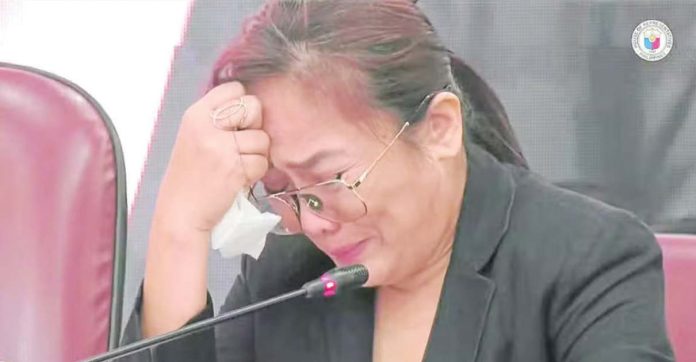
QUEZON City – After a week of reflection, former police official and Philippine Charity Sweepstakes Officer (PCSO) general manager Royina Garma decided to spill the beans on the police reward system that lubricated the brutal war on drugs of the Duterte administration.
A tearful Garma disclosed to the House of Representatives Quad Com late Friday evening that the idea of expanding the Davao template of the war on drugs came from no less than former President Rodrigo Roa Duterte himself as he was about to take on the reins of power in May 2016.
Reading her affidavit, Garma said that sometime in May 2016 Duterte summoned her to his house in Doña Luisa, Davao, and instructed her to look for an operative who is a member of the Iglesia Ni Cristo (INC) as “he needed someone capable of implementing the war on drugs on a national scale, replicating the Davao model.”
Garma said the Davao model “is a system of payment and rewards” involving three levels: first is the reward if the suspect is killed; second is funding for planned operations or COPLANS; and third is the refund of expenses incurred during operations.
Garma added that she initially demurred, not having been previously assigned to areas outside of Davao, but eventually gave the name of erstwhile National Police Commission member Edilberto Leonardo, her upperclassman at the Philippine National Police Academy (PNPA) and whom she knew to be a prominent member of the INC.
Cong. France Castro wondered why Duterte specified an INC member to head the drug war machinery. Garma said she was not comfortable asking the former president why she was being asked to recommend someone from the religious group.
Bong Go connection?
Garma soon learned that her endorsement of Leonardo was successful. A certain “Muking” asked for Leonardo’s contact details the day after she spoke with Duterte and was later told by Arthur Narsolis that Leonardo had been summoned by Duterte to the Mandaya Hotel in Davao City. Narsolis is the subject of a contempt citation for his repeated failure to appear at the House hearings.
Leonardo stayed at the hotel for three days where Duterte instructed him to organize a “task force similar to the PAOCTF (Philippine Anti-Organized Crime Task Force).”
Garma said Leonardo told her that he had prepared an outline for the operations of the task force, which he then presented to the former president through his assistant Bong Go.
Garma added that Bong Go paved the way for PNPA classes 1996 and 1997 to have a photo opportunity with Duterte at the Department of Public Works and Highways (DPWH9 building in Panaca, Davao City a few days before he officially assumed as President in July 2016. This meeting became the subject of the Quad Com inquiry in previous hearings when it became apparent that a select class of police officials had been tapped to implement the Davao template.
Leonardo was transferred from his assignment in Manila to head the Criminal Investigation and Detection Group (CIDG) in Davao in June 2016. Garma said that in the first three months of Leonardo’s reassignment it was she who facilitated his meetings with Bong Go. They were able to later on establish a direct connection.
According to Garma, Leonardo submitted a document to Bong Go detailing the operations of the task force, including “an overview of the current drug landscape in the Philippines.”
In a statement released to the media Saturday Sen. Bong Go denied any participation in the war on drugs.
The Task Force
Garma’s affidavit contains the names of people tapped by Leonardo to implement the Davao model.
Rodel Bactat, Rodel Cerbo, and Michael Palma are police officers stationed at CIDG regional office 11. They collected and verified information submitted by policemen in the field respecting deaths and arrests of individuals listed in Duterte’s narco-list. They were assisted by Peter Parungo, a former detainee at the CIDG.
Garma revealed these policemen were dismissed from the service last year because of an operation that resulted in the death of one individual.
It was Leonardo who decided the level of killings and arrests, including the corresponding rewards. Refunds for operational expenses and rewards for agents were coursed through Parungo’s bank accounts with several banks.
Leonardo would periodically report to Bong Go the killings of drug personalities, including requests for refunds for expenses. Lester Bargonio, a private citizen, “maintained a comprehensive list of drug personalities in the Philippines.”
A document from the Executive Secretary released this Saturday showed that Leonardo has resigned as Napolcom commissioner, and that President Marcos has accepted the resignation “effective immediately.”
In her testimony Friday evening, Garma also implied that the assassination of Tanauan, Batangas in July 2018 may have been the handiwork of a team of policemen from Region 7./PN



